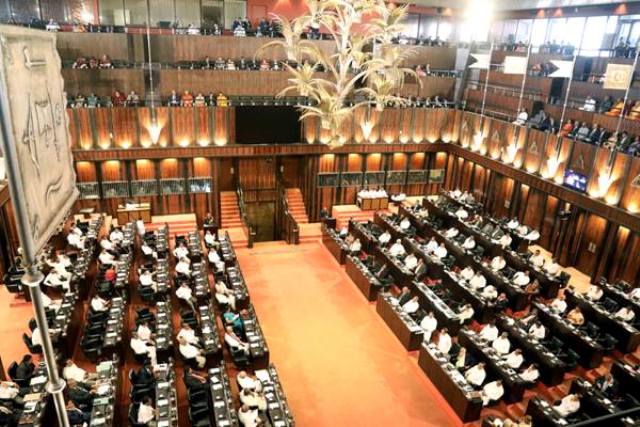 The Sri Lankan parliament chamber [photo from Sri Lanka Parliament, Facebook]
The Sri Lankan parliament chamber [photo from Sri Lanka Parliament, Facebook]
[This excerpt is from an article which appears in the opinion section of The Round Table Journal is by Dayanath Jayasuriya, President’s Counsel, Colombo, Sri Lanka. Opinion pieces do not reflect the position of the Round Table Board.]]
Several political events have unfolded in Sri Lanka within a matter of a few weeks between October and December 2018. Asia’s longest surviving democracy witnessed shocking scenes of fisticuffs and unruly behaviour by some parliamentarians, damage to property in the legislative chamber, the speaker taking extraordinary measures in a desperate bid to maintain decorum in the House, two competing claims for the post of prime minister, and a presidential proclamation by Maithripala Sirisena on 9 November 2018 dissolving parliament and setting the stage for a snap general election.
Sri Lanka’s 1972 constitution, crafted partly to reflect the French presidential system, has been the subject of numerous amendments. The 19th amendment, passed in 2015, was intended, inter alia, to trim the powers of the executive president. The amendment was largely the handiwork of lawyers and law-makers loyal to the prime minister, Ranil Wickremasinghe; but as the unfolding events of recent weeks showed, perhaps the implications of some of its provisions were not subjected to close scrutiny by supporters of the president.
On 26 October 2018, in a move that surprised the entire nation, the president suddenly purported to remove the incumbent prime minister, Ranil Wickremesinghe, and appointed as the new prime minister his arch rival and one-time president, Mahinda Rajapakse (in whose cabinet the president had served before defeating him at the polls in 2015). This was done ostensibly on the basis that it appeared to the president that the latter was better able to command the support of a majority of members of the House of Representatives (despite the numbers indicating otherwise).
Rajapaksa’s attempts to garner support by getting MPs from Wickremesinghe’s party and a few minority parties did not succeed and the speaker repeatedly maintained, on the basis of a vote taken on the floor of the House, that it was Wickremesinghe who enjoyed the support of the majority. Even so, Rajapaksa quickly formed a cabinet of ministers and made populist announcements such as a reduction in the price of petroleum products. Wickremesinghe steadfastly refused to vacate his official residence, claiming that he was the de jure prime minister. He held consultations with Western diplomats and it turned out that, apparently, other than China no foreign government had sent Rajapakse a message of congratulations. An application filed in the Court of Appeal for a writ of quo warranto resulted in an interim order preventing Rajapaksa and his cabinet ministers from performing their duties until a final hearing took place.
The jurisdiction of the Supreme Court was invoked to challenge the proclamation of 9 November 2018.
From 2015 onwards Sri Lanka had a government propped up by members of parliament supporting Sirisena and Wickremasinghe. The president alluded in several speeches to the difficulties he encountered during that period of cohabitation. An allegation of a plot to kill the president, which is currently under investigation (albeit at a slow pace), compounded the situation, with fingers being pointed at unspecified elements antagonistic to the president. An uneasy stalemate ensued, paralysing the national economy and public service.
On 13 December 2018 a seven-judge bench of the Supreme Court, headed by the Chief Justice, unanimously held that the proclamation of 9 November was void ab initio. In the aftermath of that decision, Rajapakse stepped down as prime minister and the president reappointed Wickremesinghe as the prime minister.
The expectation that the dust had finally settled was soon shattered. A decision by the speaker to appoint Rajapakse as the leader of the opposition was opposed by the Tamil National Alliance, whose leader, R. Sampanthan, had held that position previously.



